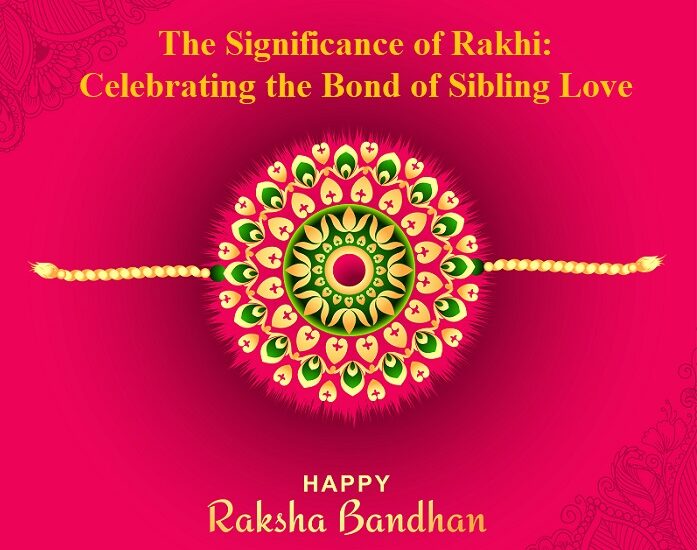In the diverse tapestry of Indian culture, one festival that holds a special place in the hearts of millions is Raksha Bandhan, commonly known as Rakhi. This auspicious occasion, celebrated with great fervor and enthusiasm, is a testament to the deep bond shared between brothers and sisters. Rakhi transcends religious boundaries and unites people in celebrating the essence of sibling love, protection, and lifelong commitment. This article delves into the significance of Rakhi and explores the traditions and rituals associated with this beautiful festival.
Raksha Bandhan, which falls on the full moon day of the Hindu month of Shravana, is an age-old tradition that dates back several centuries. The term “Raksha Bandhan” is derived from two words: “Raksha,” meaning protection, and “Bandhan,” meaning bond or tie. Together, they symbolize the sacred bond of love and protection between brothers and sisters. Sisters tie Rakhi around brothers’ wrists. Brother vows to protect and support their sisters throughout their lives.
Significance of Rakhi
The significance of Rakhi extends beyond biological siblings. It is not uncommon to witness the tying of Rakhis between cousins, close friends, and even neighbors, emphasizing the universality of love and protection. It acts as a reminder of the responsibilities siblings have towards each other, and it strengthens the existing bond, fostering unity and harmony.
The rituals associated with Rakhi are filled with tradition and symbolism. Sisters often begin the day by preparing a thali (plate) containing the Rakhi thread, roli (vermillion powder), rice grains, and sweets. They perform an aarti (ritual of waving a lamp) and tie the Rakhi on their brothers’ wrists, accompanied by prayers for their well-being and prosperity. Brothers, in turn, shower their sisters with gifts, expressing their gratitude and love. This exchange of gifts signifies the mutual affection and appreciation between siblings.
The Rakhi thread itself holds great significance. It is a talisman of protection. Sisters tie the Rakhi around their brothers’ wrists, symbolizing the brother’s commitment to safeguard and shield his sister from harm. The Rakhi has the power to ward off evil and bring good fortune.
Rakh brings together families, as siblings often travel long distances to celebrate this special day together. The festival is marked by joyous gatherings, feasts, and the sharing of laughter and memories.
Beyond the traditional rituals, Rakhi has evolved to embrace modern trends and values. In recent times, it is not uncommon to see sisters tying Rakhis on their sisters’ wrists, blurring the lines of gender and celebrating the bond of sisterhood. Rakhi has become an inclusive festival that recognizes and acknowledges the love and care shared between siblings.
In an increasingly globalized world, siblings separated by distance or residing in different countries exchange Rakhis through mail or virtual means. This allows them to connect and celebrate the festival, transcending geographical limitations.
Rakhi holds immense social significance as well. It acts as a catalyst in promoting gender equality and respect for women. The act of a sister tying a Rakhi on her brother’s wrist symbolizes her faith and trust in her brother’s ability to protect and support her. It serves as a reminder that brothers have a responsibility to create a safe and respectful environment for their sisters. Rakhi encourages brothers to become allies in the fight against gender discrimination and violence, promoting the idea of gender equality and empowering women.
In India, where people follow various religions and belong to different cultural backgrounds, Rakhi acts as a unifying force. It brings people together, bridging gaps and fostering a sense of brotherhood and sisterhood beyond religious or cultural differences. Rakhi has the power to strengthen the social fabric of the nation, promoting peace and understanding among diverse communities.
Rakhi is not just a one-day festival. It is a reminder that the love, care, and support shared between siblings. It should extend beyond a single day of celebration. The Rakhi becomes a symbol of the enduring relationship between siblings. It reminds siblings to be there for each other, to offer support, guidance, and unconditional love throughout their lives.
Conclusion
Rakhi holds immense significance as a festival that celebrates the profound bond of sibling love. It goes beyond mere rituals and ceremonies, encompassing the values of protection, unity, and mutual respect. Rakhi serves as a reminder of the responsibilities siblings have towards each other. And the importance of nurturing and cherishing the bond they share. It transcends religious and cultural boundaries, promoting gender equality and social harmony. Rakhi is a beautiful celebration that brings families together, strengthens relationships, and spreads love and joy.

